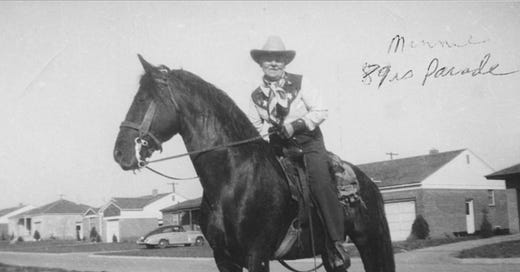“The Adventures of a Girl” is one part diary and two parts memory book. The young author’s memories provide glimpses of her rambling childhood in 1950s America. The entries reflect her optimism and resilience as she navigates through the changes in life. Chapter TWO is posted here in its lightly edited form. To read more, go to “The Adventures of a Girl.”
TWO: Fair Time, Early Fall, 1951. Oklahoma City, Okla.
For a brief time, I lived an idyllic childhood in a lovely suburban neighborhood in Oklahoma City. The neat curbs that lined our street reminded me of pie crust, shaped as if it was their job to keep the grass from spilling from our yard. The early 1950s neighborhood had the look of post-war hopefulness. Two and three-bedroom brick houses sat on broad lawns, each one equipped with newly planted shrubs and a single tree. Our new grade school was a couple of blocks away, walking distance for my sister and me. The classrooms were furnished with individual desks sized to fit first graders, large or small. I was one of the smallest.
My family, like a migratory flock, had settled in Rancho Village after the war. Our house sat on one corner of Johnson St. across from my aunt who lived on the opposite corner. My grandmother lived around the corner, and one of my uncles lived a few streets over.
One bright morning in the fall, I remember my grandmother, we called her Big Mama, showing up in front of our house. Riding a horse. In the street. Mother, with my sister and me glued at her side, led us outside to see the horse. When Big Mama leaned from the saddle to call us over, the reddish brown creature snorted. We quickly retreated back to a safer spot on the curb. With another snort, the horse pawed the pavement, sending out an echoing thwack each time its hoof struck the street. The sight of a massive horse on our tidy street was terrifying. Still I was fascinated to see such an animal up close. He was what I imagined how a race horse might look like—but way bigger.
The horse was courtesy of the grumpy uncle who lived close by. The story goes that on his way home from the war, he stopped off in Georgia to visit an army buddy and ended up buying the guy’s horse, fittingly named Sarge. My uncle never said how he and Sarge made it home to Oklahoma, but in his telling, he rode Sarge to Big Mama’s old house in the country, arriving in the middle of the night. Back then my grandmother always kept a gun handy, and in the dark of night came close to shooting her oldest son home from the war. He hollered out just in time, thus saving his own life and creating the makings of a good story.
The day we saw Big Mama and Sarge in the street, they were on their way to ride in the ‘89ers parade, a celebration honoring Oklahoma’s famous 1889 Land Run. My grandmother was just past 61, but looked much older with a cloud of white hair framing her face. She handled Sarge the way she did everything, confidently and fearlessly. (Our mother was a finer featured version of my grandmother, but was unlike her in every other way.) Big Mama was the oldest of ten, and like her three sisters, had a “mannish” look about her, broad shoulders, thick hands, and the McKinzie jutting chin. But I thought she looked magnificent in her western parade outfit. Her white western shirt featured a decorative western yoke and cuffs to match her boot cut pants. She set the whole look off with a flowered scarf around her neck and cowboy hat on her head.
Regardless of Sarge’s twichy, nervous stamping, my grandmother was in complete control. They were in fact, a perfect match. She seemed eager to get to the parade, which relieved us of the obligation to get closer to Sarge. Perhaps she knew mother was nervous around horses and was worried we’d get too close. So my sister and I waved goodbye—little girls in matching dresses, granddaughters of pioneers—watching our grandmother ride off down the street.
NEXT: My Father’s Plane







As a little girl, I never understand why we called her “Big” Mama. But as I matured I realized that “big” was not necessarily her stature, but her persona, whether real or imagined.
Real: I will never forget when she climbed on top of a picnic table in her eighties and belted out family folk songs at a large family reunion! She was a force to be reckoned with. Her granddaughter understood that.
Imagined: Let’s just say she once came to me posthumously in visions I still don’t quite understand.
Loved reading this story! ❤️
Wonderful.